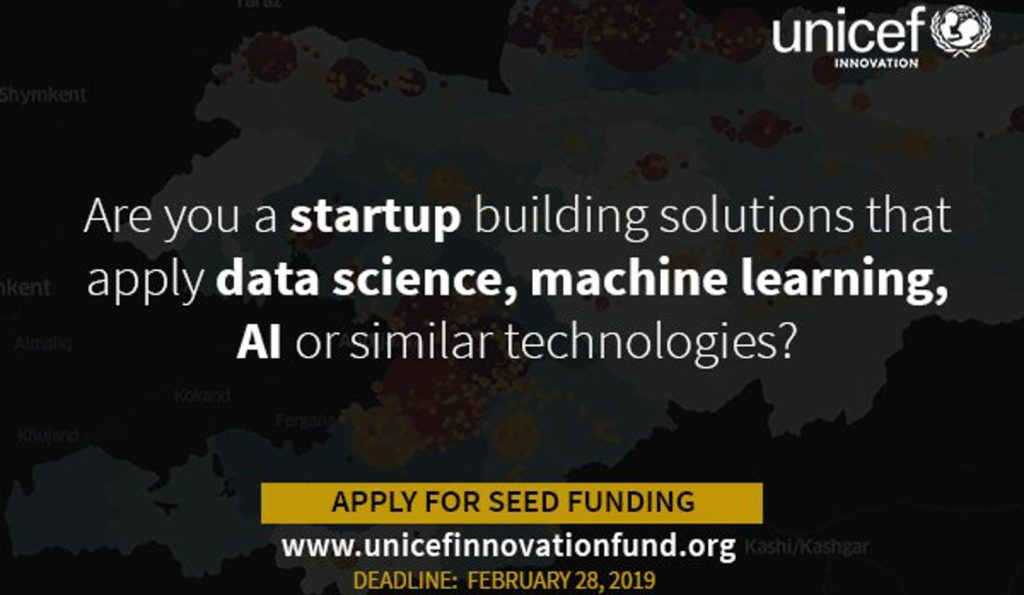AI chat is no longer just about faster answers or conversational tone. Search.com, a division of Public Good, has launched a generative AI search…
Unicef Innovation Fund launches call for data science, AI solutions

Are you running a data science or artificial intelligence (AI) startup and are looking for funding? Unicef, through its Innovation Fund, is looking to make up to $90 000 in zero-equity investments in data science, machine learning and AI solutions that have the potential to benefit humanity.
Tech startups with AI or data solutions stand to benefit from between $50 000 and $90 000 equity-free early-stage seed investments, this after Unicef Innovation fund launched a call for such solutions on Monday (7 December). Applications close on 28 February.
Through the fund Unicef aims to finance open-source solutions that can improve children’s lives.
To be eligible for selection, applicants must be resident in one of Unicef’s programme countries. In addition, startups must already have a functional, open source prototype — or one they are willing to make open source. The organisation also encouraged women-led companies to apply.
The Unicef Innovation Fund’s call for data science and AI solutions will close on 28 February
In its call for applications, Unicef said it is looking for startups that can apply data science in new innovative, scalable and globally applicable ways.
.@UNICEF is building the first cohort of 2019.
Are you a startup building solutions that apply #datascience, #machinelearning, #AI or similar technologies?
Apply for seed funding before February 28 to be part of this cohort. More info: https://t.co/UMOWWTVXLZ@hichrisfabian pic.twitter.com/fmh7wNbgm8— UNICEF Innovation (@UNICEFinnovate) January 7, 2019
The call for applications is aimed at companies that can, among other things, do the following:
- Apply deep learning to analyse satellite imagery and automatically map infrastructure such as schools, health centers, roads or cell towers.
- Use digital footprints from sources like social media or mobility patterns to understand public spaces.
- Explore machine learning or AI techniques to help better understand the physical world and its rapidly changing environments.
- Use natural language processing or similar techniques to analyse large amounts of text.
- Use machine learning and AI to understand content structures and knowledge as well as learning relationships.
- Explore machine learning or AI techniques to help better understand the digital world and its rapidly dynamics as well as changing trends.
- Use machine learning or AI to understand the relationships between different variables that impact development indicators.
- Apply optimisation techniques to improve service delivery, resource allocation or content delivery.
- Use predictive analysis to understand changes in the world such as job market trends or the supply and demand of skills.
- Gather and combine existing data from different sources.
- Generate new data through field data collection, crowdsourcing or social network platforms.
- Use novel approaches to generate, as well as to validate large amounts of training data.
Unicef Innovation Fund to invest in 20 startups in 2019
To date, the fund has made 72 investments in 42 countries and is looking to invest in 20 startups this year.
Last month the Unicef Innovation Fund announced 13 new investments of up to $100 000. At least four of these were in African companies from Egypt, Ghana, Nigeria and Tunisia.
The four are:
- Lagos-based virtual and augmented reality (VR, AR) creation lab Imisi3D was selected for its leVRn C3 solution which aims to provide quality education by designing educational modules that will enrich and improve learning experiences.
- Tunis-based company Utopixar was selected for its decentralised blockchain platform Conscience which enables collaboration on initiatives addressing social and environmental challenges.
- Accra-based VR firm NubianVR got tapped for its work building learning tools for educators and learners accessible in WebXR (an API that allows developers to create extended reality experiences).
- Cairo-based Conative Labs received an investment for its Nilebot solution, an Internet of Things (IoT)-enabled real-time water quality monitoring and aquaculture alarm system.
Keen on applying for this call? Learn more about Unicef’s Innovation Fund eligibility criteria and find out more about the application process here.
Featured image: UNICEF Innovation via Twitter


